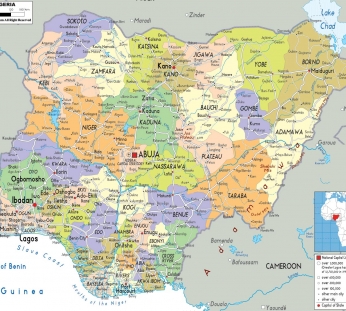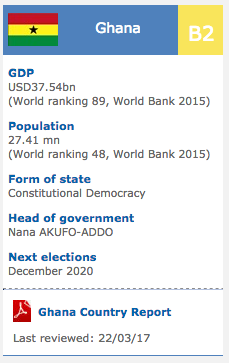-
The city that won't stop growing, Lagos
A thick layer of acrid, blue smoke hovers just above the waterfront slums that skirt Lagos lagoon, filtering out sunrise and sunset.This man-made mist that clings to the rusted shack rooftops comes from the countless fish-smoking cabins that drive the slum economy.
There’s an uninterrupted view of the city’s dramatic sprawl of poverty from the road bridges that carry daily commuters between the islands and the mainland.Fishing and sand-dredging boats drift to work, heading deep into the lagoon. A lot of of the slums’ wooden huts are on stilts, others are just basic shacks shoddily built on the unstable ground of trodden-down rubbish dumps.
More > -
OPEC raises forecasts for global oil demand
OPEC boosted estimates of request for its crude this year and next amid stronger-than-expected fuel consumption and a weaker outlook for rival supply.
The Organization of Petroleum Exporting Nations raised forecasts for the all it needs to supply in 2017 and 2018 by about 200,000 barrels a day for each year, according to a statement from its secretariat in Vienna. Still, a rebound in Libyan production pushed the group’s output last month to the highest this year, undermining its plan to rebalance oversupplied world markets.
More > -
Africa’s economic growth in 2016 was driven by East Africa
While the continent’s major economies were hit by the fall in commodity prices in 2016, Africa retained its position as the second-fastest growing continent globally recording an average of 2.2% GDP increase, behind only South Asia, according to the African Development Bank Group (AfDB).
Much of Africa’s increase in 2016, AfDB says, was driven by East Africa where several nations recorded “strong performances.” In general, of the continent’s sub-regions, East Africa posted the highest increase rate with 5.3%, led by Ethiopia.
More >
- Key Facts
-
Full name: The Federal Republic of Nigeria
Population: 162.4 million (UN, 2011)
Largest city: Lagos
Area: 923,768 sq km (356,669 sq miles)
Major languages: English (official), Yoruba, Ibo, Hausa
Major religions: Islam, Christianity, indigenous beliefs
Life expectancy: 52 years (men), 53 years (women) (UN)
Monetary unit: 1 Nigerian naira = 100 kobo
Main exports: Petroleum, petroleum products, cocoa, rubber
GNI per capita: US $1,180 (World Bank, 2010)
Internet domain: .ng
International dialling code: +234
-

Top 10 Most Attractive Investment Destinations In Africa
2017/08/20Africa’s feverish increase has decelerated in recent years and a lot of nations have buckled under the pressure of falling resource prices, security disruptions, fiscal imprudence and adverse weather conditions.
-

Africa's Relationship With China Is Ancient History
2017/07/02In 2002 South Africa's Parliament unveiled a digital reproduction of a map - of China, the Middle East and Africa - that some speculated could be the initial map of the African continent. The Da Ming Hun Yi Tu - the Comprehensive Map of the Great Ming Empire - was drawn up around 1389 during the Ming Dynasty, according to historian Hyunhee Park.
-

Climate change laws around the world
2017/05/14There has been a 20-fold increase in the number of global climate change laws since 1997, according to the most comprehensive database of relevant policy and legislation.
The database, produced by the Grantham Research Institute on Climate Change and the Environment and the Sabin Center on Climate Change Law, includes more than 1,200 relevant policies across 164 countries, which account for 95% of global greenhouse gas emissions.
-
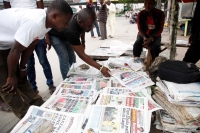
Nigeria Year in Review 2016
2017/04/17Lower hydrocarbons revenues, tight capital controls and currency volatility combined to make 2016 a challenging year for Nigeria.
By December the country was in recession, facing its initial full-year contraction for almost three decades, with the IMF expecting Nigeria’s economy to shrink by 1.7%.
Inflation, meanwhile, had climbed to an 11-year high by October. However, the outlook for 2017 appears brighter for what is still Africa’s major economy by GDP.
-
'Let's get more travel stories on Africa by Africans'
2016/07/23This month actor Louise Linton caused a social media storm at the same time as an extract of her African gap year memoir was published by the Telegraph and was widely panned online for being a tick inventory of cliches and stereotypes in the way the west has always liked to portray the continent. On Twitter, #LintonLies, set up by Zambian writer Lydia Ngoma, was trending as people started to pour scorn on Linton’s version of certain events and her take on life there. Think: “close encounters with lions”, “brutal tales of rape and murder,” and 12-inch long spiders, which would be terrifying, though they only exist in Laos.
-
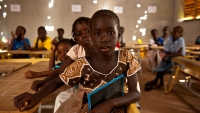
Classroom at the rural primary school Ecole Keur Madaro near Thies, Senegal.
2016/05/28Over the last 15 years, West African governments and the international community have been successful at expanding access to primary schooling and from presently on, a ground-breaking regional learning assessment has revealed that the quality of education has remained elusive. The majority of children surveyed were not acquiring the basic literacy and math skills that are crucial for building human capital in the region.
-
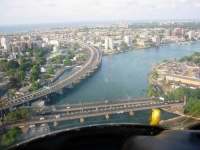
Nigeria Year in Review 2015
2016/02/12As with a lot of hydrocarbons producers elsewhere in the world, Nigeria endured a challenging 2015 as falling oil prices impacted the country’s exports and exchange earnings.
This was compounded by a range of broader macroeconomic pressures, inclunding uncertainty in the lead up to the 2015 presidential elections, a strengthening US dollar and insecurity in the north of the country. According to the IMF, these headwinds slowed Nigeria’s GDP increase to an estimated 3.2% in 2015, the lowest rate since 1999.
-

Revolutionizing Political Economic Analysis in Nigeria
2016/01/11Records of events are very significant. They serve as not only historical documents but a guide for the next. The book, Revolutionary Pen has done it properly as it chronicles events of struggles of the working people, youth and the poor, that emanated in almost all facets of the encounters of the working masses and the society at large; at each serially and not seemingly ending periods of attacks by the national on them.
It does not stop at reporting these events, but goes further to analyse the way forward the working masses and the society in general can take to end these national attacks and as well to realise their own inherent political power, which can and only give them the panacea, to rebutting the system of oppression, and take charge of their patrimony.
-
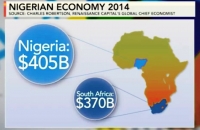
Nigeria Year in Review 2014
2015/03/30Falling oil prices and increased instability in the north impacted Nigeria’s economic increase in 2014, though a rebasing of GDP means that whoever wins the forthcoming presidential elections in 2015 will take the helm of Africa’s major economy.
-
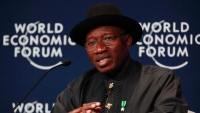
Nigeria Year in Review 2014
2015/01/23Falling oil prices and increased instability in the north impacted Nigeria’s economic increase in 2014, though a rebasing of GDP means that whoever wins the forthcoming presidential elections in 2015 will take the helm of Africa’s major economy.
-
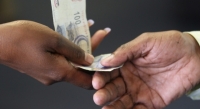
Nigeria’s resolution vehicle set up after its 2009 financial crisis
2014/04/20Amcon, Nigeria’s resolution vehicle set up next its 2009 financial crisis, has made a lot of evolution restructuring the billions of dollars of loans it holds. But its chief executive Mustafa Chike-Obi says its work will get harder and argues against calls for it to be wound down quickly.
-

Nigerian woman launches first black entertainment TV
2013/08/12A woman who could be considered Africa’s Oprah Winfrey is launching an entertainment network that will be beamed into nearly each country on the continent with programs showcasing its burgeoning middle class.
Mosunmola “Mo” Abudu wants EbonyLife TV to inspire Africans and the rest of the world, and change how viewers perceive the continent. The network’s programming tackles women’s daily life subjects — everything from sex tips to skin bleaching.
-

Africa: Making Things Happen at the Bank - 'Not a Talk Shop' - Akin Adesina
2017/07/02Dr. Akinwumi Adesina is focusing on five areas to achieve the African and world goals for a prosperous continent since becoming president of the African Development Bank - Africa's major public financial institution in September 2015. He was a keynote speaker at this month's Corporate Council on Africa's U.S.- Africa Business Summit in Washington D.C. and moderated a lively panel with five African government ministers. He as well received the Gene White Lifetime Succcess Award from the World Child Nutrition Foundation. This week, he was named the 2017 recipient of the World Food Prize, a prestigious honor that includes a $250,000 award. In an interview in Washington, DC, Adesina discussed the Development Bank's ambitious schedule and his vision for attracting the increase capital Africa needs. Posting questions for AllAfrica was Noluthando Crockett-Ntonga.
-
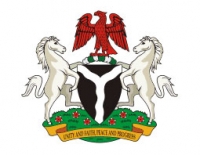
Outlook for 2013-17
2013/10/10The country (Nigeria) is situated in Western Africa and bordering the Gulf of Guinea, between Benin and Cameroon. It has borders with Niger for 1497 km, Benin for 773 km, Cameroon for 1690 km and Chad for 87 km.
Land in Nigeria is southern lowlands merge into central hills and plateaus; mountains in southeast, plains in north. Nigerian land covers an area of 923768 km²The climate is varies, is equatorial in the south and tropical in center and arid in north. Nigerian(s) speak English (official), Hausa, Yoruba, Igbo (Ibo), Fulani.
Overview
The major threat to political stability is the Islamist militancy in the north of Nigeria. However, there are as well various social tensions that frequently provoke violent unrest in other parts of the country. Despite instability in the north, the president, Goodluck Jonathan, and his People's Democratic Party (PDP) will remain in power at least until the next elections, in 2015.
-
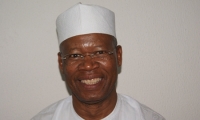
Dahiru Mohammed, Chairman & CEO of Damagix Nigeria
2013/01/03“My advice for Nigerian companies is that they must not be in a hurry to grow. That is a mistake that most indigenous companies make. They want to start today, and reap the benefits of it 2 years down the line,” Mr. Mohammed told World Report in an interview.
“They need to grow gradually, and stay focused. They have to be honest to their clients and their technical partners,” he said.
Damagix offers a whole range of pipeline services, from onshore, offshore and deep-water oil and gas operations. Its expertise includes pipe supply, manpower, environmental and consultancy services.
-
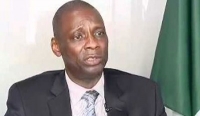
Mustafa Chike-Obi, Managing Director and CEO of AMCON,
2013/01/03In order to save the banking system, the government created the Investment Management Corporation of Nigeria, whose brief was to acquire the NPL’s from the banks and provide them with injections of liquidity. The effect has been to replace the banks’ capital adequacy ratios and, additional importantly, to replace public faith in the country´s banking system, with the consequent effects on the economy as a whole.
-
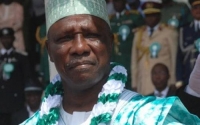
Patrick Ibrahim Yakowa, Governor of Nigeria´s Kaduna State,
2013/01/03Sitting across from Governor Patrick Ibrahim Yakowa at 7am on a Monday morning recently, what struck my colleagues, Tatiana Valle, Regional Director Mercedes Pagalday and I as journalists and communications’ specialists working in Nigeria, was His Excellency’s commitment to promoting Kaduna.
-
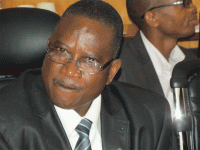
Oladele Amoda CEO
2012/12/06Nigeria has 5,900 megawatts of installed generating capacity. Nevertheless, the country is only able to generate around 4,000MW. Most facilities are poorly maintained. Infrastructure development is one of the largest focuses of the current government and it is estimated that by 2012, 90 % of the country will be covered.
-
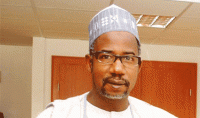
Abuja
2012/12/06Abuja is the capital city of Nigeria. It is located in the centre of Nigeria, within the Federal Capital Territory (FCT). Abuja is a planned city, and was built mainly in the 1980s. It officially became Nigeria's capital on 12 December 1991, replacing Lagos, which is still the country's most populous city. At the 2006 census, the city of Abuja had a people of 776,298,making it one of the top ten most populous cities in Nigeria. Nevertheless, Abuja has witnessed a huge influx of people into the city which has led to the emergence of satellite towns such as Karu Urban Area, Suleja Urban Area
- Construction projectsMore >
- Environment ProjectsMore >
- Local GovernmentMore >
- Petroleum / Mining More >
- Renewable energyMore >
- Art / Culture
- Nigeria News
-
- LOCAL GOVERNMENT: The city that won't stop growing, Lagos
- PETROLEUM / MINING : OPEC raises forecasts for global oil demand
- ECONOMY: Africa’s economic growth in 2016 was driven by East Africa
- REAL ESTATE: Improved liquidity, currency volatility can give Sub-Saharan Africa real estate markets a Boost
- CONSTRUCTION / INFRASTRUCTURE: Africa's Infrastructure Spending Drops
- HEALTH: Healthcare Property holds benefits for Africa
- Trending Articles
-
- BOTSWANA: Bill Gates sees US likely to maintain aid levels for Africa
- NIGERIA: The city that won't stop growing, Lagos
- EUROPEAN UNION: UK seeks to 'align' with EU on data protection rules
- ANGOLA: Buhari Among African Presidents Who Lack Faith in Own Health Systems
- PAKISTAN: Qatar launches new direct sea route to Pakistan
- BOTSWANA: Africa’s economic growth in 2016 was driven by East Africa











